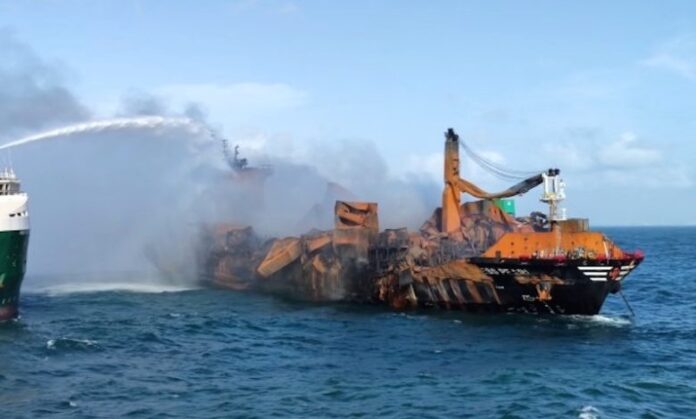July 24, Colombo (LNW): In a landmark ruling that will have far-reaching implications for maritime regulation and environmental accountability in Sri Lanka, the country’s Supreme Court has issued a powerful judgment over the 2021 MV X-Press Pearl disaster, which has been recognised as the gravest marine pollution incident in the history of the Indian Ocean.
Delivering a strongly worded verdict, the Court held both the state and the vessel’s operating parties culpable, citing a catalogue of failures and negligence that led to widespread environmental devastation and economic hardship for thousands of Sri Lankans, particularly those in coastal communities.
One of the centrepieces of the ruling was a directive requiring the ship’s owners and operators to pay US$ 1 billion in compensation. This figure, the Court stated, was intended not only to account for the extraordinary environmental degradation but also to address the lasting socio-economic damage suffered by affected communities, especially among the island’s fishing population.
The disaster, which saw the MV X-Press Pearl catch fire and sink while carrying tonnes of toxic chemicals and plastic pellets, released over 70 billion plastic nurdles and hazardous substances into Sri Lankan territorial waters.
Beaches were blanketed in plastic, marine life was killed in vast numbers, and the livelihoods of thousands were left in ruins. The Court officially declared the incident the most severe marine pollution event ever recorded in the Indian Ocean.
In its judgment, the Supreme Court found that multiple state agencies had failed to take necessary precautions or respond in a timely and effective manner. The Marine Environment Protection Authority (MEPA), the Harbour Master, and several other officials were singled out for their lack of action.
The Court also made particular mention of former State Minister of Urban Development, Dr Nalaka Godahewa, highlighting his inaction during a critical period.
It ruled that the state’s failures amounted to a violation of citizens’ constitutional rights—particularly the right to equal protection under the law and the freedom to pursue lawful livelihoods. Fisherfolk, in particular, bore the brunt of these infringements, as large swathes of coastal waters became unusable for months, with some areas still affected to this day.
The judgment firmly reinforced the “polluter pays” principle, affirming that corporations engaging in hazardous shipping activities must be held financially and legally responsible for any damage they cause. The ship’s owners, charterers, and agents were all deemed jointly liable.
In a bid to ensure transparent and equitable distribution of the compensation, the Court ordered the creation of an independent high-level commission. This body will be tasked with channelling the US$ 1 billion in a manner that directly benefits those most impacted—particularly fishing communities—and prioritises ecological restoration efforts along the coast and seabed.
Beyond redress, the Court went a step further by calling for immediate legislative and institutional reforms. It recommended overhauling existing maritime and environmental safety regulations, ratifying relevant international conventions, and improving the country’s ability to respond swiftly to similar incidents in the future.

